“Blackbird” (2019 production, 2020 release). Cast: Susan Sarandon, Sam Neill, Kate Winslet, Mia Wasikowska, Rainn Wilson, Lindsay Duncan, Bex Taylor-Klaus, Anson Boon. Director: Roger Michell. Screenplay: Christian Torpe. Web site. Trailer.
We’re all aware that our lifetimes are finite in nature and that they will one day come to an end. But, as our lives unfold, many of us become progressively more concerned with how that end will ultimately come about. Will it be on terms of our own choosing? Or will we relegated to circumstances that are out of our control? And how much input will we have in determining the details of the process? Those are among the questions raised in the moving new end of life drama, “Blackbird.”
Life for aging ALS patient Lily (Susan Sarandon) has become a shadow of what it once was. The fiercely independent free spirit, who could easily be the poster child for the causes of choice and free will, has led a rich, remarkable, experience-filled life on her terms. However, with the advance of her illness and failing physical state, she’s seen that existence shrink considerably. She’s lost the use of an arm, her breathing has become labored and her sense of balance has grown precarious. She still insists on being as self-sufficient as possible, often refusing help from others, like her dutifully patient, ever-well-meaning physician husband, Paul (Sam Neill). But, even with such strong-willed determination, Lily sees the writing on the wall and realizes that she’s only weeks away from being confined to a network of life-sustaining equipment that, in her view, will only prolong her suffering. For someone with her temperament, that’s worse than a death sentence.
With such a clear awareness of her circumstances, Lily decides to take action. She’s determined to bring matters to a conclusion on her terms, no matter what others may think or what the law may say. She thus sets plans in motion to make her exit in the way she wishes to leave.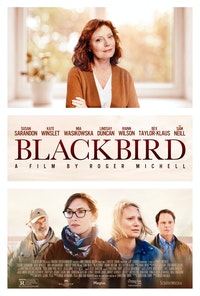
In essence, Lily plans a celebration of life for herself and her family. She summons her nearest and dearest to her Connecticut seashore home over Thanksgiving weekend for what she wants to be a loving, fun-filled gathering that marks one last time for sharing long-standing traditions, heartfelt sentiments and joyful good times. And, at the conclusion of that time together, having said her goodbyes and with Paul’s assistance, she plans to quietly slip away, letting go of her pain and courageously moving on to whatever grand adventure awaits her next.
Lily sees the weekend as a time of great expectations. Yet, despite the best laid plans, it also has the potential for emotionally charged upset and debates about the wisdom of her decision, despite agreements made in advance to keep the mood positive and prevent those issues from arising. Nevertheless, considering what’s at stake and what’s about to transpire – a weepy and trying time fraught with possible legal consequences – there’s a good chance that Lily’s plans may not unfold as hoped for. Add to that the revelation of long-hidden secrets and previously unexpressed emotions, and you’ve got a volatile mix that the well-intentioned patient may not want – and that she may have never seen coming.
Gathering for the weekend are those who have long been in Lily’s life: her elder daughter, Jennifer (Kate Winslet), a privileged, uptight perfectionist who always wants to do the right thing and mercilessly insists that others do the same; her flighty, ungrounded younger daughter, Anna (Mia Wasikowska), whose mysterious disappearances and erratic behavior always keep the family guessing; Jennifer’s husband, Michael (Rainn Wilson), an impish, playful sort who tries to deflect conflict but ultimately has difficulty keeping a lid on his frustration; Anna’s on-again/off-again lesbian partner, Chris (Bex Taylor-Klaus), an old soul in a young body who frequently provides much-needed wisdom in the midst of chaos; Lily’s teenage grandson, Jonathan (Anson Boon), a chip off his free-spirited grandmother’s shoulder; and Lily’s oldest friend from college, Liz (Lindsay Duncan), a kindred spirit who has been with her through all the good times and remains fiercely loyal even in the face of death.
Over the course of the weekend, Lily has an opportunity to spend time with each of those in attendance, saying what’s gone unsaid and seeking to wind up any remaining unfinished business. The attendees also have an opportunity to share time with one another, expressing their feelings and having a chance to address outstanding issues. It’s a time for being spontaneous and uninhibited, such as celebrating an early Christmas, something that Lily realizes she’d be in no shape to properly enjoy if she chose to postpone her self-inflicted demise for a month. And it’s also a time to wax philosophically about issues like taking chances, breaking rules, exercising one’s power of choice, and knowing when to hold on – and to let go.
It’s an experience that proves remarkably rewarding, devastatingly difficult and curatively purging, all at the same time. It gives everyone an opportunity to take away from it exactly what he or she needs. And it’s something that ultimately will touch everyone in ways never thought possible. But, then, none of that would have happened were it not for their willingness to exercise their powers of choice and free will, and isn’t that what life is ultimately all about?
As I have written on a number of occasions, choice and free will are among our most precious birthrights, and we should make every effort to value them, using them judiciously in the ways we lead our lives. However, all too often, we disavow these attributes, claiming that we’re unable to exercise them or, even worse, contending that they don’t even exist. Such practices significantly diminish our lives, leading to existences that are unfulfilling and full of regrets, truly sad outcomes to be sure. Which is why the example Lily sets is so valuable, showing us the importance of our capacities for choice and free will in our lives, even in matters as weighty as how we die.
How we make use of these aspects of our lives depends greatly on our thoughts, beliefs and intents, the cornerstones of the conscious creation process, the philosophy that maintains we draw upon the power of these metaphysical tools in shaping the reality we experience. They drive what happens, framing the nature of our existence and everything within it. And, if we want that experience to be all it can, we had better be careful how we wield that power. Do we want a life that consists of what fulfills us? Or do we capitulate to the dictates of convention, even if it’s not what we want, simply because we’ve allowed ourselves to believe we have no choice in the matter?
Lily has lived her life under the assumption that she’s in the driver’s seat. She has long decided what she wanted. She has followed her heart, even if it’s not the path that others would take or whether they would approve of them. In fact, she’s not about to let trifles like the law dictate how she lives her life – or leaves it behind. To do otherwise in any of these contexts would go against her very nature, her true, authentic self. And she’s not about to stop now, even as her journey approaches its end. As she comes upon what is perhaps the most important event of her life, she’s patently unwilling to go through it on terms that don’t suit her.
As Lily reflects back on her life over the weekend, she reminisces about the many vivid, colorful experiences she’s had during her time on the earthly plane. She speaks fondly of the chances she took, unafraid to bend or break the rules to provide herself with the satisfaction she sought. She relishes her sexual adventures, her enjoyment of art and music, her drug experiences, her times as a wife and mother, and much, much more. Together those elements have woven a rich tapestry of experience, one characterized by experimentation, fulfillment and a willingness to courageously dismiss her fears. This combination has made for a truly heroic journey, one that we should all seek for ourselves during the time we’ve got.
Lily hopes that her decision to stage this final farewell will not only bring her what she wants, but that it will also set an example for those closest to her. She sees it as an opportunity to celebrate the life she has led, an experience she hopes others can appreciate and adopt for themselves to add more joy to their lives. She looks at her daughter Jennifer, for instance, and sees someone who has everything going for her but doesn’t enjoy it because of her neurotic demeanor. Moreover, she’s concerned that Jennifer’s constant worrying and niggling attitude are diminishing her quality of life, an outlook that Lily fears could be rubbing off on her grandson, filling his head with foolish notions and pointless preoccupations at a highly impressionable time in his life. Consequently, Lily doesn’t hesitate to make her opinions known on these fronts, hoping that they’ll have an impact in reshaping the beliefs that Jennifer and Jonathan hold. This becomes pointedly (and hilariously) apparent during the family’s impromptu Christmas gift exchange in which Lily gives each of them presents that poignantly reflect her views, hoping that they’ll make her viewpoint more than abundantly clear.
Of course, if we truly want such a satisfying life for ourselves, we need to discern what makes it worth living and what doesn’t. And, to that end, we need to be able to determine what’s worth keeping and what to release, particularly when it comes to what no longer serves us, even if that means our very physical existence. Lily has a keen sense about this, and, when she comes to realize that her failing physical state is preventing her from living the life she wants, she knows what she needs to do. With no likely prospect of recovery in her future, she consciously decides to avoid the probability that seems unavoidable. She thus embraces beliefs that make such an outcome possible and will subsequently bring it into being.
Despite good intentions and seemingly clear foresight, however, that doesn’t mean everyone involved in this co-creation will whole-heartedly share Lily’s aims. After all, those attending the farewell weekend are about to lose their beloved wife, mother and friend. As supportive as they might want to be, there’s still a sense of hesitancy lingering in their thoughts and beliefs. Can they really go along with Lily’s plan, no matter how much they love her? And, even if they fundamentally disagree with her decision, can they keep up a sufficiently credible front to reassure her otherwise?
Nevertheless, as difficult as all of the foregoing may seem, and even with a vague awareness of others’ doubts, Lily is determined to push ahead. She knows the time has come. But, even with that knowledge, over the course of what’s to be her final holiday celebration, she wants to remain committed to living in the now, fully engaged in the moment and all it has to offer. And that’s wise advice for all of us, especially in light of how preoccupied so many of us are when it comes to the way we live our lives, overly concerned with a past that’s come and gone or a future that has yet to arrive. Lily wants to immerse herself in the warmth and love around her at the time, while simultaneously expressing gratitude for what she has and having no regrets for what she doesn’t. With the end nearing and the time remaining to enjoy her life running out, she wants to make the most of every moment left while she still has the chance, an enviable example to follow.
The right to die is one of those topics that tends to divide society along rigidly defined lives, and that’s very likely going to be the case with a film like “Blackbird.” Director Roger Michell’s touching, thought-provoking, deeply moving drama, an American remake of the Danish offering “Silent Heart” (“Stille hjerte”) (2014), examines the dynamics within a family wrestling with this notion while honestly and lovingly addressing the heartfelt feelings associated with such a profound and intentional choice. While a few story elements don’t work quite as well as they probably could have, most of the narrative is handled sensitively and realistically, all brought to life by the superb performances of its stellar ensemble, particularly Sarandon, Neill, Wasikowska and Duncan. This release will obviously disturb some viewers, but others will be deeply moved – and fervently reminded that what we do with our lives (especially in the now) is up to us and no one else’s business. The film is available for online streaming and in limited theatrical release.
It should be noted that “Blackbird” has been the victim of some unfair criticism, that it’s yet another manipulative movie about a dying protagonist, an admittedly overworked cinematic theme. However, characterizing “Blackbird” as a picture about a dying protagonist oversimplifies what it’s seeking to address. It’s not a story about a character dying but about a character’s right to die, a topic that needs to be examined and debated much more fully than it has been. With the exception of a few films like “Whose Life Is It Anyway?” (1981) and the made-for-cable offering “You Don’t Know Jack” (2010), the right to die has been something of a taboo subject. But, as we should all be aware, death is indeed part of life, and how we approach it shouldn’t be a subject that’s hushed up or only spoken about in whispers in dark corners. We should all have the right to determine the conditions of our departure if we choose to do so, and pictures like this help to draw the subject into sharp focus. They should be applauded for their candor and forthrightness in helping to make it possible for us to move on to our own next grand adventures in the ways we seek.
As we approach death, a time when we often find ourselves at our most vulnerable, we may well feel disempowered and lacking in self-worth. Those conditions are bad enough in themselves, but, when we add to that indignities that magnify the state we’re in, we might feel even more despairing, compounding the woeful circumstances we’re already experiencing. Is that how we really want to spend our last days? Or do we want to create conditions that will uplift us and allow us to make peace with ourselves during such a trying time? Achieving such an outcome may push us to take charge of the situation, forcing us to be strong and resolute at a time when doing so could be fundamentally difficult. But, if that’s the price we must pay, then we must steel our resolve to realize the fulfillment we seek, no matter what others may think. It’s our life that’s at stake, and we have a fundamental right to live it the way we desire, even (indeed especially) in its precious final moments.
Copyright © 2020, by Brent Marchant. All rights reserved.
Friday, September 25, 2020
‘Blackbird’ wrestles with matters of life and death
Monday, September 21, 2020
Check Out The Cinema Scribe

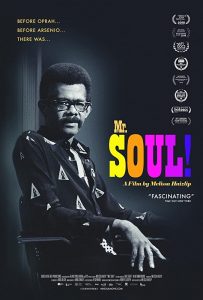
Friday, September 18, 2020
This Week in Movies with Meaning
Reviews of "Mr. Soul!", "Eternal Beauty" and "The Bare Necessity," as well as two film festival previews, are all in the latest Movies with Meaning post on the web site of The Good Media Network, available by clicking here. 





Tune in for the return of Movies with Meaning on The Good Media Network's Frankiesense & More broadcast, now in its new video format on YouTube, available by clicking here, or by visiting the network's Facebook video page. Join host Frankie Picasso and yours truly as we discuss the state of the film industry and review 8 new films. Tune in for some lively movie talk!




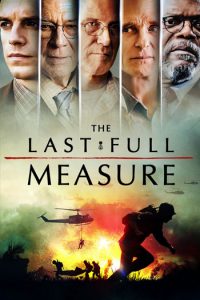

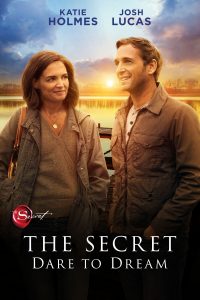


Thursday, September 17, 2020
‘Eternal Beauty’ sheds light on the search for ‘normal’
“Eternal Beauty” (2019 production, 2020 release). Cast: Sally Hawkins, David Thewlis, Penelope Wilton, Billie Piper, Morfydd Clark, Alice Lowe, Paul Hilton, Spencer Deere, Robert Pugh, Natalie O’Neill, Elysia Welch, Boyd Clack, Rita Bernard-Shaw, Robert Aramayo (voice), Nicholas Lumley. Director: Craig Roberts. Screenplay: Craig Roberts. Web site. Trailer.
Throughout our lives, we’re often bombarded by statements, observations and criticisms associated with what constitutes “normal.” But what is that exactly? It’s often considered something ordinary and everyday, yet it frequently gets elevated to a standard that’s essentially unattainable, prompting us to wonder what good it would be then. Finding our way through such a perplexing maze can become a challenge even under the best of conditions, but it’s especially frustrating for someone with special circumstances, as illustrated in the engaging new character study, “Eternal Beauty.”
Life can be difficult when we don’t know what to make of it. Just ask Jane (Sally Hawkins), a middle-aged Welsh woman who drifts through life trying to figure it out. That’s a challenge, given that she suffers from schizophrenia and doesn’t know what to grab onto – or even how to do so. As a consequence, she aimlessly ambles from situation to situation, some seemingly “normal,” some delightfully humorous and others dangerously dark. She’s unable to discern which set of circumstances is “right,” either for her personally or for what she believes constitutes the greater scheme of things. And, as she wanders through this uncertain and sometimes-surreal landscape, her frustration with not being able to determine how to handle herself or the direction of her life becomes painfully obvious.
Jane’s circumstances represent more than an inability to cope; that comes with the territory of a larger issue – not being able to fundamentally figure out how life works or what’s best for her. Because of that, she stumbles through her daily existence, looking for the right fit. One could call this an extreme exercise in trial and error, but, when nothing seems to work, onlookers view Jane’s routine with a mixture of sadness, pity, anger and disdain, depending on who’s doing the observing. Their reactions and recommendations often complicate matters, as they’re largely unable to offer helpful advice. They sometimes even make matters worse by spewing uninformed criticism based on a lack of understanding of the underlying issue that Jane is experiencing, making her circumstances that much worse as she attempts to sort out that input in addition to everything else.
[caption id="attachment_11757" align="aligncenter" width="350"] Jane (Sally Hawkins), a middle-aged schizophrenic patient, seeks to figure out how life works in the new character study, “Eternal Beauty,” now available for first-run online streaming. Photo courtesy of Samuel Goldwyn Films.[/caption]
Jane (Sally Hawkins), a middle-aged schizophrenic patient, seeks to figure out how life works in the new character study, “Eternal Beauty,” now available for first-run online streaming. Photo courtesy of Samuel Goldwyn Films.[/caption]
Jane’s existence is characterized by incidents and phenomena whose verifiability is sometimes dubious at best. She’s frequently beset by what appear to be hallucinations. She often makes statements and expresses opinions rooted in what seems to be questionable information. And she routinely receives phone calls from a mystery man (Robert Aramayo) who comes across as a possible past lover seeking reconciliation. It’s indeed difficult to verify how much of this is “real,” be it for everyone or just for her. The doubt cast by such unsubstantiated manifestations certainly raises issues for Jane, as well as those who care about her well-being.
Those standing by and watching Jane as she attempts to live her life can’t help but wonder how she ended up in such a state. Some, like her sister, Alice (Alice Lowe), and her doting father, Dennis (Robert Pugh), desperately want to understand and help her sort matters out. Others, such as her mother, Vivian (Penelope Wilton), her brother-in-law, Tony (Paul Hilton), and her other sister, Nicola (Billie Piper), are surprisingly hostile, demonstrating little patience for her erratic, unpredictable behavior and her cryptic, sometimes-caustic statements. And others, such as her psychiatrist (Boyd Clack), perfunctorily follow established, standardized protocols, regardless of whether they’re effective or suitable for Jane’s needs. But all of those responses, to one degree or another, don’t get to the bottom of Jane’s circumstances – or answer the fundamental underlying question raised in this paragraph’s opening sentence.
Some clues are offered in flashbacks to Jane’s youth, when her younger self (Morfydd Clark) suffered a series of setbacks – most notably being left at the altar and a failed effort at competing in a beauty pageant. The emotional devastation she suffered was truly profound. But, the closer one looks, the more one also sees that the kinds of responses to her behavior that are routinely thrust upon her now were present in her past as well. The impatience and intolerance typical of Vivian and Nicola, for example, are apparent in both of their younger selves; the behavior of Jane’s mother and her sister’s younger self (Natalie O’Neill) at times was downright cruel and, on occasion, nearly as unpredictably volatile as that of their target, suggesting that this mental health condition may run in the family. At the same time, Jane was not without well-meaning allies, again her father and Alice’s younger self (Elysia Welch), but their attempts at helping her then were about on par as they are now.
[caption id="attachment_11758" align="aligncenter" width="350"]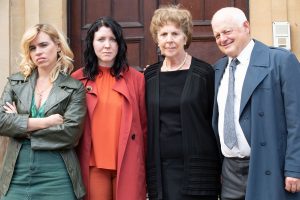 A family with a schizophrenic daughter/sibling seeks to provide help with her condition but with varying degrees of success, as sisters Nicola (Billie Piper, left) and Alice (Alice Lowe, second from left) and parents Vivian (Penelope Wilton, second from right) and Dennis (Robert Pugh, right) discover for themselves in the new character study, “Eternal Beauty.” Photo courtesy of Samuel Goldwyn Films.[/caption]
A family with a schizophrenic daughter/sibling seeks to provide help with her condition but with varying degrees of success, as sisters Nicola (Billie Piper, left) and Alice (Alice Lowe, second from left) and parents Vivian (Penelope Wilton, second from right) and Dennis (Robert Pugh, right) discover for themselves in the new character study, “Eternal Beauty.” Photo courtesy of Samuel Goldwyn Films.[/caption]
However, even though these conditions from the past may have contributed to the development of Jane’s circumstances as an adult, they don’t appear to tell the whole story, and that’s apparent through her present behavior and her ostensible inability to figure out how to sort everything out. As she seeks to determine what circumstances constitute “normal” for her, whether or not she can find love (as she attempts to do in a wildly unpredictable relationship with a fellow mental patient and would-be aging rock musician, Mike (David Thewlis)) and how to find a suitable semblance of happiness in her life, Jane ponders the possibilities, acting upon them with varying degrees of success. And, through it all, she continues to deal with the assistance and recommendations offered by others, regardless of whether they offer any meaningful help.
To her credit, Jane seems to possess a special wisdom that those unafflicted with mental health issues appear to lack. In part, it accounts for some of her irritatingly acerbic remarks (and clearly explains the defensive reactions that others sometimes have to her spot-on observations). But, if Jane herself would only come to realize that she has this gift, it might help her to turn things around in her life. It just might provide her with answers to the core questions she’s unable to address by attempting to employ more conventional means, the kind the rest of us ordinarily rely on but that are wholly inadequate for her. And that could set her on a path to the satisfaction and fulfillment that have eluded her all of her life.
The overarching question in this story is, “What constitutes ‘normal’?” Is there some kind of standard that applies to everyone? And, if so, why does Jane have so much trouble conforming to it? Why aren’t the suggestions and treatments offered by others doing any good? Wouldn’t that suggest, then, that the one-size-fits-all notion doesn’t work? Is it thus possible that a more variable, personally relative standard is more accurate, more realistic?
[caption id="attachment_11759" align="aligncenter" width="350"] The younger self of middle-aged schizophrenic patient Jane (Morfydd Clark, center) competes in a beauty pageant, one of a number of incidents that contributed to the onset of her condition, in the new character study, “Eternal Beauty.” Photo courtesy of Samuel Goldwyn Films.[/caption]
The younger self of middle-aged schizophrenic patient Jane (Morfydd Clark, center) competes in a beauty pageant, one of a number of incidents that contributed to the onset of her condition, in the new character study, “Eternal Beauty.” Photo courtesy of Samuel Goldwyn Films.[/caption]
For decades now, the principle that has come front and center in the metaphysical/New Thought community is the notion that we each create our own reality. Whether this concept is couched in terms of conscious creation, the law of attraction or even a simple belief in the idea that “life is what you make of it,” the underlying mechanics behind it are the same – that we draw upon the power of our thoughts, beliefs and intents in shaping the existence we experience, regardless of the form that reality ultimately takes, for better or worse. Indeed, if it’s something that can be employed to manifest an existence considered “normal” or “mainstream,” then couldn’t the same be said to materialize an outcome that’s outside of those parameters, one that’s “different” or “alternative”? Logically it would seem so, and, if that’s the case, then Jane’s experience would appear to offer an example of that notion at work.
Of course, given that Jane seems to have difficulty relating to the people and circumstances around her, one might legitimately ask, “Why would anyone want to create such an existence?” The challenges involved in that might be seen as overly daunting. Onlookers may view it as sad or tragic. And the creator of such a reality may have to endure endless frustration due to an inability to relate to his or her own circumstances in comparison to everyone else. It could be seen as a case of trying to squeeze the proverbial square peg into a round hole. Yet here’s Jane doing just that, so the question once again becomes, “Why?”
The underlying reasons for why we create the existence we do is, of course, no one’s business but our own. In many cases like this, it often involves materializing the conditions necessary to experience certain life lessons, no matter how unconventional they may be. It’s all part of the growth and development of our greater selves, to learn things that can only be achieved by undergoing such alternative life paths. Admittedly, this may not be the most ideal course, but, if it gets us what we want and need, then it naturally follows we’d pursue these circumstances to achieve the desired results.
[caption id="attachment_11760" align="aligncenter" width="350"] Middle-aged schizophrenic patient Jane (Sally Hawkins, right) tries her hand at romance with an aging would-be rock musician, Mike (David Thewlis, left), in director Craig Roberts’s second feature, “Eternal Beauty.” Photo courtesy of Samuel Goldwyn Films.[/caption]
Middle-aged schizophrenic patient Jane (Sally Hawkins, right) tries her hand at romance with an aging would-be rock musician, Mike (David Thewlis, left), in director Craig Roberts’s second feature, “Eternal Beauty.” Photo courtesy of Samuel Goldwyn Films.[/caption]
In line with that, such experiences make clear that alternative approaches to life like this are just as viable and valid as those considered more conventional. Strange as they may seem to some of us, they may be perceived as perfectly suitable to those living through them. In fact, those traversing these different paths may look upon what the rest of us experience as just as “inadequate.” Experiencers of the alternative may indeed find that their realities enable them to “get into their oils,” a Welsh expression used routinely in the film that roughly means “finding oneself in one’s element,” no matter what that may constitute. As Jane searches for her “oils,” she may discover that an alternative lifestyle that those around her might readily eschew proves highly suitable for her, even if she’s alone in her convictions.
In presenting this view, the film thus provides us with a new outlook – indeed, perhaps even a new understanding – of what someone like Jane is genuinely experiencing. It suggests that she’s not actually enduring a mental illness but that she’s attempting to navigate her way through an alternate approach to reality creation that differs markedly from those around her. Some might be quick to contend that the setbacks she underwent in her youth and, potentially, the impact of family genetics on her physical being may offer “proof” of her “disease.” And it’s entirely possible that these influences may have played a role in helping to shape what she’s going through. Yet they may have also manifested as part of the larger experience she’s now attempting to maneuver through, that they’ve served as “tools” to help bring about the ends she seeks. So, with that in mind, Jane’s experience may actually prove valuable in helping us to better appreciate what those in her condition are actually undergoing and why – and to help us find more effective ways to interact with them that don’t disparage or mischaracterize them, their circumstances or what they’re ultimately attempting to achieve for themselves. This could shed a whole new light on them, us and the nature of reality itself.
Based loosely on the fact-based experiences of a woman known as “Calamity Jane,” this intense character study depicts a protagonist struggling to cope with her existence in an engaging and honest manner but without ever passing judgment on her life and behavior. The film never pleas for pity nor seeks to ridicule, but it quietly encourages us to consider possibilities that may have never crossed our minds before, and it does so more by “showing” than “telling” in its efforts to shape our views and perspectives. Despite a meandering opening segment – one that’s designed to drive home the relentless frustration Jane experiences (but that nevertheless still goes on a little too long) – the picture otherwise capably presents a candid depiction of what we call mental illness, without ever resorting to clichés, excesses or false impressions. Hawkins turns in yet another superb performance as the troubled protagonist, with fine support from Thewlis, Wilton and Clark. Director Craig Roberts’s second feature, now available for online streaming, represents an ambitious effort with a profound underlying message, one with the potential to radically reshape our outlooks on existence, mental well-being and what we consider “normal.”
Understanding the nature of our existence is often a life-long challenge. We often like to think we have it figured out, only to have our assessments torpedoed. And that process can be made all the more frustrating by continually examining it through the lens of what’s supposedly “normal.” We routinely second-guess ourselves, believing we must somehow hold ourselves up to some kind of established (though ultimately arbitrary) standard, only to discover (over and over) that “normal” is a relative quality for each of us, based on our beliefs and what we use them to create in our lives. Maybe we’d all be a lot better off if we just skipped ahead to that notion in the first place, holding to it, no matter how much each of our respective views of what constitutes “normal” differ from one another. We might well find that doing so leaves us a lot happier in the end. And isn’t that what “normal” is ultimately all about?
Copyright © 2020, by Brent Marchant. All rights reserved.
Tuesday, September 15, 2020
‘Mr. Soul!’ celebrates radical creativity
“Mr. Soul!” (2018 production, 2020 release). Cast: Interviews: Nick Ashford, Valerie Simpson, Amiri Baraka, Harry Belafonte, Kathleen Cleaver, Carmen De Lavallade, David Leeming, Nikki Giovanni, Dr. Harold G. Haizlip, Stan Lathan, Felipe Luciano, Christopher Lukas, Melba Moore, Novella Nelson, Dr. Alvin Poussaint, Dr. Billy Taylor, Robert J. Thompson. Archive Footage: Ellis Haizlip, Mohammad Ali, Sidney Poitier, Cicely Tyson, Louis Farrakhan, Stevie Wonder, Billy Preston, Kool & the Gang, Harold Melvin & the Blue Notes, Teddy Pendergrass, Patti Labelle, Gladys Knight & the Pips, the Delfonics, Black Ivory, James Baldwin, Toni Morrison, Georgia Jackson, Al Green, Anna Maria Horsford, Maya Angelou, Bill Withers, Earth Wind & Fire, Hugh Masekela, The Last Poets, Roberta Flack, Stokely Carmichael, Arsenio Hall, Ruby Dee, Ossie Davis, Jerry Butler, Curtis Mayfield, Richard Nixon. Narrator: Blair Underwood. Directors: Melissa Haizlip and Samuel D. Pollard. Writer: Melissa Haizlip. Web site. Trailer.
Many of us tend to think of creativity in lofty terms, that it’s something to be admired and appreciated largely for its purely aesthetic attributes. And that’s certainly all well and good, as it can move us profoundly. But there are times when creativity can do more – much, much more. It can have an impact that inspires not only its creators, but also those who look upon it in awe and wonder, perhaps even enough to change minds and collective thinking in revolutionary ways. In that regard, the influence it wields can be truly radical, as was the case with an innovative but today little-known 1960s television series profiled in the excellent new documentary, “Mr. Soul!”
The American television industry in the 1960s aggressively promoted its latest technological advancement – broadcasting in color. But, of all the hues available, there was one that dominated over all others – white, at least when it came to the color of the characters in its programming and the demographic segment of the viewing audience to which it appealed. Minorities were virtually nowhere to be seen. This neglect was particularly true for the Black community. With the exceptions of sporting events, the Diahann Carroll sitcom Julia (1968-1971) and occasional guest spots by “acceptable” entertainers of color (such as Nat King Cole, Harry Belafonte and Lena Horne) on variety shows, African-Americans otherwise typically appeared only in news reports about riots and poverty. This had to change, but how would that come about?
The answer rested with National Educational Television (NET), the forerunner of the Public Broadcasting System (PBS). As a government-funded organization, NET had an obligation to serve the people – all the people – including those whose voices were underrepresented or not being heard. This was the ideal venue for the Black community to take its place in the world of broadcasting.
As the first Black producer at New York’s NET affiliate, WNDT (later WNET), Ellis Haizlip was approached by station management to see if he would be interested in developing a program focused on the African-American community, particularly in the areas of arts and entertainment. In essence, the broadcast was envisioned as a Black version of The Tonight Show. Having experience with staging theatrical productions while attending Howard University, as well as putting on concerts and plays in Europe and the Middle East with the likes of Marlene Dietrich and James Baldwin, Haizlip was well positioned (and extremely well connected) to take on the task of producing the newly envisioned show. And so, before long, with funding support from NET and The Ford Foundation, Haizlip was off and running. The new series, Soul!, was about to change the face of television.
As an experienced producer, Haizlip was content to remain behind the scenes. His specialty was providing the means for his artists to perform at their best, enabling them to enjoy the limelight they so deserved; he did not want to do anything that would draw attention away from them. So, when it came time to select a host, Haizlip willingly stepped aside, opting to hand over the show to noted Harvard psychologist Dr. Alvin Poussaint. However, as an educator, Poussaint was not suited for the job of TV host. The torch then passed to the producer’s cousin, Dr. Harold G. Haizlip, also an educator, but, again, the fit wasn’t right. With no options left, the responsibility fell to Haizlip himself, who took on the job reluctantly.
Even though Haizlip was experienced as a producer, he was not trained as an interviewer. He was somewhat reserved and rather cerebral, qualities one wouldn’t readily consider integral to being a television show host. And, as he initially assumed the position, he was noticeably awkward and lacked charisma. However, as time passed, he grew into the job, a development aided by the phenomenal array of guests that he and his staff assembled to appear in every episode of the program. What’s more, since he made it possible for his guests to shine in their own right, their performances helped to camouflage whatever deficiencies he may have had in the role of host. Most importantly, though, even as he developed as a host, he did the same for Soul! that he did for all of his prior productions – he let the talent show their stuff and never upstaged their work. He was indeed an impresario but one without a need to stand out himself or to let his ego get in the way.
What was most impressive, though, was the work he accomplished through his stint with Soul! He helped launch the careers of countless emerging Black artists in music, literature, poetry, dance and acting, while also featuring established figures in those areas. This was revolutionary not only for the fact that the show featured Afrocentric artists, but also that it included segments on things like poetry and dance at all, arts that mainstream television completely overlooked. No one would have seen programming like this on the three major networks of the day.
Haizlip’s lineups were truly impressive. During the show’s run, he featured musical performances by the likes of Ashford & Simpson, Harry Belafonte, Melba Moore, Dr. Billy Taylor, Stevie Wonder, Billy Preston, Kool & the Gang, Harold Melvin & the Blue Notes, Teddy Pendergrass, Patti Labelle, Gladys Knight & the Pips, the Delfonics, Black Ivory, Al Green, Bill Withers, Earth Wind & Fire, Hugh Masekela, Roberta Flack, Jerry Butler and Curtis Mayfield. Among the actors and actresses who appeared were Novella Nelson, Sidney Poitier, Cicely Tyson, Ruby Dee, Ossie Davis, Arsenio Hall and dancer Carmen De Lavallade. Poets and authors played a major role, too, including Amiri Baraka, Nikki Giovanni, The Last Poets, James Baldwin, Toni Morrison and Maya Angelou. And that’s just the tip of the iceberg.
Haizlip also gave a voice to African-American politicians and activists at a time when it was difficult for them to be heard. He made it a point not to restrain them, either, allowing them to speak their minds and express their frustration, something that never would have made it on the air on the networks. He featured interviews with the likes of Kathleen Cleaver (wife of Eldridge Cleaver and Communications Secretary of the Black Panther Party), Georgia Jackson (activist and mother of deceased Black revolutionary George Jackson) and Stokely Carmichael (civil rights activist and organizer of the Pan-African movement). Haizlip also engaged in on-air conversations with Nation of Islam leader Louis Farrakhan and with boxer Mohammad Ali, who, at the time, was fighting attempts at being drafted for service in Vietnam due to his conscientious objector status.
Given that Soul! was featuring programming found nowhere else on TV, it developed a captive audience with its core viewership. It’s estimated that 65% of the nation’s African-American community tuned in for its weekly broadcasts from 1968 to 1973. This immense popularity truly set its ratings apart from those of mainstream network offerings, quite a feat at a time when viewing options were considerably more limited. But, with such a devoted following, why did it only last five seasons?
Because Haizlip was willing to give voice to his guests, this practice did not always set well with large segments of mainstream society. While Black viewers were taking tremendous pride in having their uncensored views finally heard, it made others uncomfortable, most notably many White Americans. They were afraid of what the show’s more controversial guests might stir up, especially at a time of tremendous racial volatility. Haizlip himself was somewhat controversial, too, given that he wasn’t afraid to admit that he was an openly gay man, a rare commodity in mainstream society at the time. Many were concerned about what NET/PBS might be unleashing through this “dangerously” provocative show, especially since it was being funded with taxpayer dollars.
With the election of President Richard Nixon in 1968, the U.S. began taking a more conservative turn in its politics in the wake of the turmoil of the now-waning decade, and the new Chief Executive was only too willing to comply with this change. Little by little, alternative voices of all kinds – but especially in the Black community – were being quietly but systematically squelched. Funding for community programming in all areas was being cut, and eventually that included minority broadcasting efforts. And Soul!, unfortunately, became the prime target. In 1973, the Corporation for Public Broadcasting announced that the show would not be included in its funding allocations for the forthcoming year.
Because of the show’s popularity, many wondered why such a seemingly successful production would be cut off in its prime. There was considerable speculation, though no definitive answer was forthcoming – that is, until the release of this film, which includes an excerpt from Nixon’s infamous Oval Office tapes in which he and his advisors openly discussed how to silence Black voices in the media. In an effort to make African-Americans invisible once again, that discussion eventually led to the decision to cut the funding for minority broadcasting like Soul!, no matter how successful such programming might have been.
However, even though Soul! had a shorter run than most would say it deserved, it opened a door for the future. Were it not for that groundbreaking series, American television never would have seen the emergence of programming like The Arsenio Hall Show and The Oprah Winfrey Show, as well as the many comedy and dramatic offerings featuring Black performers in lead and supporting roles.
That’s the legacy that “Mr. Soul!” celebrates. Through interviews with some of Haizlip’s guests (Nick Ashford, Valerie Simpson, Amiri Baraka, Harry Belafonte, Kathleen Cleaver, Carmen De Lavallade, Nikki Giovanni, Melba Moore, Novella Nelson and Dr. Billy Taylor) and collaborators (Stan Lathan, Felipe Luciano and Christopher Lukas), as well as those who have assessed the program’s social impact (such as Robert J. Thompson, Syracuse University media analyst, and David Leeming, biographer of Haizlip’s friend James Baldwin), viewers gain eye-opening insights into the significance of the show and the man who brought it to life. The wealth of extremely well-preserved archive footage is astounding and is alone easily worth the price of the ticket. But, above all, this picture preserves the memory of a production that made so much possible on so many fronts, one that, were it not for this film, might have easily been lost to history.
As many of the interview subjects in the film observe, Soul! was a truly radical undertaking, and Haizlip was himself a quiet revolutionary. He dared do things with the show that no one else in the industry was willing to touch. That’s because he believed in the possibility of this project and committed to make it happen. In that sense, he proved himself to be a master of the conscious creation process, the philosophy that maintains we draw upon our thoughts, beliefs and intents in manifesting the reality we experience. And, even if he never heard of it, it was obvious that he had learned how to deftly employ its principles.
Chief among his accomplishments was his knack for breaking through barriers. His ability to envision the untried and then bring it into being showed just how skillful he was in questioning the conventional and subsequently obliterating the limitations that hold us back. He gave expression to the unexpressed, with results that stunned and impressed audiences, which, in turn, helped to change minds and reshape public thinking. That’s no small feat.
Haizlip’s ability to accomplish this provided opportunities to those who might not otherwise get them. One need only look to the list of entertainers, authors and activists who may never have had a chance to make themselves and their talents known. But that was not his only achievement in this regard; he made comparable opportunities available to those who worked on the show’s production staff. In addition to giving jobs to African-Americans, he hired a significant number of women to work on the show, some of whom freely admit in the film that this was a major breakthrough for them. They contend that, although many of them had actively participated in the civil rights movement earlier in the decade, they tired of the fact that it was largely a sexist undertaking. Minorities may have assumed all of the important roles, but those positions were nearly always reserved for men. Haizlip changed that. He believed in them and made it happen on the job front.
To that end, Soul! was an excellent example of a successful co-creation, one in which all of the participants pooled their energies, collectively and fervently working toward fulfilling a common goal. That kind of commitment can make a powerful statement, regardless of the undertaking. But, in this case, the enthusiasm that the collaborators brought to the project and the faith they had in its success epitomize what can result from this kind of zealous cooperation. Would-be joint venturers could learn a lot from this example.
Haizlip accomplished something else worthy of note – he shared his talents, abilities and resources in aiding others without any expectation of personal glory for his efforts. This kind of selflessness is rarely seen in an industry characterized by enormous egos and petty retribution for a lack of reciprocity. In many ways, this was a prime example of the concept of paying it forward. It worked wonders and contributed immensely to the show’s and Haizlip’s success. Having been given the opportunity to produce this series, its creator freely gave back, showing tremendous gratitude for such good fortune, something that made it possible for him to extend the favor to others. That’s a quality sorely lacking in many undertakings today, and we as a society could benefit tremendously by following that lead.
In the end, Haizlip’s experience indicates that, in producing this show, he vigorously practiced the conscious creation principle known as value fulfillment, the notion associated with us being our best, truest selves to benefit ourselves and the world at large. One could say it was his destiny to create Soul! and the impact it had on so many fronts. But, in addition to the influence the project had, it also appeared to give its creator tremendous joy. And, as I once read in a Chinese fortune cookie, “There is no greater joy than creation.” Haizlip clearly relished his role in this and left a mark that continues to resonate even today.
This excellent, informative and entertaining documentary tells a truly captivating story. In addition to paying homage to the show, “Mr. Soul!” presents a fitting tribute to its creator and host, a pioneer whose attainments have not been recognized as widely as they should have been. The film’s expertly assembled collection of interview footage, archive material, and voiceover segments featuring Haizlip’s writings and observations (narrated by actor Blair Underwood) combine to form a kaleidoscopic portrait of a man and his work that truly helped change the world. And its message is still relevant today as we contend with these challenging times. The timing of its release couldn’t be more appropriate, and, even though Haizlip may have been gone for nearly 30 years, one can’t help but wonder whether his spirit has played a role in making this happen at a time when it’s desperately needed, perhaps now more than ever.
Those who have never heard of Haizlip or Soul! owe it to themselves to see this superb release. This 2018 production has largely played at film festivals over the past two years, but, thankfully, it is now available for online streaming.
Sometimes the greatest contributions to our lives and cultures come from those who seem to be the unlikeliest of contributors. At first glance, Ellis Haizlip might have appeared to some as one such example. His reserved demeanor, cerebral perspective and desire to work behind the scenes were qualities that many would not have looked upon as being integral to inspiring groundbreaking accomplishments. Yet he did just that, and in more ways than one can count. That’s radical transformation at work – something we could use more of these days. One can only hope that there are aspiring visionaries out there who will be so moved by this film that they’re eager to follow suit – and change the world in their own way.
Copyright © 2020, by Brent Marchant. All rights reserved.
Friday, September 11, 2020
‘Bare Necessity’ inspires us to strip away the clutter
“The Bare Necessity” (“Perdrix”) (2019 production, 2020 release). Cast: Swann Arlaud, Maud Wyler, Fanny Ardant, Nicolas Maury, Patience Munchenbach, Alexandre Steiger, Bastiste Kerroué. Director: Erwan Le Duc. Screenplay: Erwan Le Duc. Web site. Trailer.
How often have you wanted to rid yourself of the unnecessary elements of your life, removing the clutter and seriously focusing only on what’s most important? Like cleaning an overstuffed closet, it’s something many of us say we have to get around to doing one day but somehow don’t manage to find the time – that is, until our hand is forced and we have to do it out of necessity. Wouldn’t it be easier if we made peace with the idea and just went ahead with it of our own volition? Maybe so, but in getting to that point, even the most conscientious among us may find that we need a little inspiration to get started, an issue raised in the delightfully quirky new French romantic comedy, “The Bare Necessity” (“Perdrix”).
Sassy free spirit Juliette Webb (Maud Wyler) is looking for a new home. The independent thirty-something has been on her own since her teens when she and her parents decided they didn’t need one another any more. So, over the ensuing years, she has wandered about Europe (mostly her native France) with all of her worldly possessions – mostly a detailed collection of personal journals – in the back seat of her car. Being unburdened by lots of extraneous stuff, she has been able to remain sufficiently mobile. In fact, her vehicle is about the only material possession on which she absolutely relies. So, naturally, it comes as quite a shock when it’s stolen.
[caption id="attachment_11744" align="aligncenter" width="350"] French Police Captain Pierre Perdrix (Swann Arlaud, left) takes a statement from free spirit Juliette Webb (Maud Wyler, right) after her car is stolen from a rural rest area by a naked woman in the quirky new romantic comedy, “The Bare Necessity” (“Perdrix”). Photo courtesy of UniFrance.[/caption]
French Police Captain Pierre Perdrix (Swann Arlaud, left) takes a statement from free spirit Juliette Webb (Maud Wyler, right) after her car is stolen from a rural rest area by a naked woman in the quirky new romantic comedy, “The Bare Necessity” (“Perdrix”). Photo courtesy of UniFrance.[/caption]
While driving through the sleepy, sparsely populated Vosges Mountains, Juliette stops at a rest area to collect her thoughts and do a little journaling. However, while sitting on a bench not far from her car, she witnesses a naked woman hop into the vehicle and take off, leaving her stranded in what seems like the middle of nowhere. Now what?
Juliette makes her way to the nearest town, visiting the local gendarmerie to file a report about the theft. There she meets the local police captain, Pierre Perdrix (Swann Arlaud), a genial but often put-upon sort who spends virtually all of his time attending to the needs of others, devoting little attention to himself. There’s his eccentric officers, such as Michel (Alexandre Steiger), a lovelorn gay man smitten with the captain. And then there’s his dysfunctional family – his mother Thérèse (Fanny Ardant), a widowed radio talk show host whose amorous advice call-in broadcast no one listens to; his brother Ju Ju (Nicolas Maury), a scientist unnaturally obsessed with earthworms; and his pre-teen niece Marion (Patience Munchenbach), who’s dissatisfied with her living arrangements and is looking into boarding schools. And now there’s Juliette, who, with no place to stay, shows up unannounced on Pierre’s doorstep, inviting herself in for meals and lodging while the investigation of her stolen car unfolds.
Juliette’s unreserved, often-irritating demeanor doesn’t sit well with Pierre’s family. The captain often finds her abrasive as well, but, curiously, he seems comparatively more tolerant than the others. Nevertheless, she still proves to be a handful, especially in light of all of the other challenges he’s having to deal with, such as a band of World War II history buffs planning to re-enact the town’s liberation from the Germans, a production including tanks and other military vehicles. And then there’s that thieving naked woman who stole Juliette’s car; as it turns out, she belongs to a local group of radical nudists who run around naked robbing others of their possessions (usually their clothes) to stress the notion of our need to strip down to our “bare essentials.” Clearly, Pierre’s plate is full. Maybe he could stand to empty it a bit.
[caption id="attachment_11745" align="aligncenter" width="350"] Besides the responsibilities of his job, French Police Captain Pierre Perdrix (Swann Arlaud, right) must deal with the issues of his needy family, including his mother Thérèse (Fanny Ardant, left), his brother Ju Ju (Nicolas Maury, second from left) and his niece Marion (Patience Munchenbach, second from right), in the offbeat new romantic comedy, “The Bare Necessity” (“Perdrix”). Photo courtesy of UniFrance.[/caption]
Besides the responsibilities of his job, French Police Captain Pierre Perdrix (Swann Arlaud, right) must deal with the issues of his needy family, including his mother Thérèse (Fanny Ardant, left), his brother Ju Ju (Nicolas Maury, second from left) and his niece Marion (Patience Munchenbach, second from right), in the offbeat new romantic comedy, “The Bare Necessity” (“Perdrix”). Photo courtesy of UniFrance.[/caption]
And that, it seems, may be why Pierre finds himself growing progressively more intrigued by Juliette as he spends more time with her. He’s taken with her sense of free-spiritedness, because it’s something he lacks and could certainly use in his life. He also appears to grow increasingly infatuated with her, especially when he takes steps to loosen the shackles that hold him back. But will he truly let go of what’s weighing him down? Can he detach from the neediness of his family, his co-workers and his community? That remains to be seen.
When we seek to change our lives, we often recognize the need, but not necessarily the means, to accomplish it. Because of that, we need some kind of inspiration to get the process started, to provide us with clues and show us the way. Without it, we’re likely to stay stuck where we are, dissatisfied and unfulfilled.
So it is for Pierre. He claims to be satisfied with his life, but is he really? There is plenty of evidence to the contrary, yet he doesn’t seem to know how to get off the dime – that is, until circumstances around him begin to take a different turn. Those influences plant seeds to initiate change. But, in actuality, the inspiration to launch that effort began with him, even if he didn’t recognize that fact. It first appeared in his thoughts, beliefs and intents, the building blocks of the conscious creation process, the philosophy that maintains we draw upon these tools in shaping the reality we experience. And now that he has drawn these inspirational manifestations into his life, they can begin to do their work to encourage their creator to begin moving his life in a new direction.
[caption id="attachment_11746" align="aligncenter" width="350"] The independence of free spirit Juliette Webb (Maud Wyler, right) rubs off on uptight Police Captain Pierre Perdrix (Swann Arlaud, left) as he seeks to establish a more liberated attitude for himself in director Erwan Le Duc’s debut feature, “The Bare Necessity” (“Perdrix”). Photo courtesy of UniFrance.[/caption]
The independence of free spirit Juliette Webb (Maud Wyler, right) rubs off on uptight Police Captain Pierre Perdrix (Swann Arlaud, left) as he seeks to establish a more liberated attitude for himself in director Erwan Le Duc’s debut feature, “The Bare Necessity” (“Perdrix”). Photo courtesy of UniFrance.[/caption]
So just what are those influences? For starters, there are the radical nudists, advocates for stripping away what we don’t need and getting back to basics. The naked rebels may not have impacted Pierre personally, but, since he’s the local police captain, he has an awareness of their presence through his investigations of their alleged crimes. That places them and, more importantly, their ideology squarely on his radar. And, given that their core message is perfect for someone who needs to follow suit (even if not literally), this places Pierre in a position to take a cue from what they have to say.
Then there’s Juliette, whose approach to life echoes the radical nudists. But, since she has more direct contact with Pierre than the local disrobed warriors, Juliette has a greater opportunity to prompt the good captain into shifting his outlook and changing his life. Through his ongoing interaction with the unconventional nonconformist, he begins to see what’s weighing him down and holding him back. He comes to realize that he can’t solve the problems of others. In fact, and even more importantly, he recognizes that it’s not his responsibility to do so; that’s on them, and whether or not they choose to act on those questions is up to them, not him.
That’s important when one sees just how much Pierre has put his needs on the back burner to take care of others. For instance, since no one listens to his mother’s radio call-in show, he willingly phones the host to let her believe that people are actually listening. Then there are his self-absorbed co-workers, who seem to be more consumed with their respective hobbies than they are with doing police work, leaving him to handle most of the day-to-day operations while they pursue their personal interests. And, of course, there’s Juliette, who dumps all of her needs on him during the search for her missing car.
However, in Juliette’s case, there’s a different agenda at work. She may come across as helpless, but it’s also apparent she’s quite self-sufficient, especially in light of the fact that she’s been on her own since her teens. Her seeming neediness is designed to inspire Pierre into taking action to change his life – to annoyingly nudge him into placing his own concerns first for once, to stand up and proclaim “Enough already!” This is reinforced, albeit contrarily, by her often-cavalier attitude, showing Pierre just how to go about asserting himself. Her intent thus differs from the others in Pierre’s life, all of whom are willing to remain feeble, dependent upon him to take care of them.
[caption id="attachment_11747" align="aligncenter" width="350"] The beauty of France’s Vosges Mountains provides a stunning backdrop for the on-again, off-again romance of free spirit Juliette Webb (Maud Wyler, left) and uptight Police Captain Pierre Perdrix (Swann Arlaud, right) in the new romantic comedy, “The Bare Necessity” (“Perdrix”). Photo courtesy of UniFrance.[/caption]
The beauty of France’s Vosges Mountains provides a stunning backdrop for the on-again, off-again romance of free spirit Juliette Webb (Maud Wyler, left) and uptight Police Captain Pierre Perdrix (Swann Arlaud, right) in the new romantic comedy, “The Bare Necessity” (“Perdrix”). Photo courtesy of UniFrance.[/caption]
By eliminating such clutter from his life, Pierre has an opportunity to rid himself of what no longer serves him. It enables him to evolve as an individual, to assert his true self – steps aimed at giving him a more fulfilled life. When stripped of the needless flotsam, he can be the person he truly wants to be – and has probably wanted to be – for a long time. It’s indeed amazing what a little inspiration can do.
It should be noted that the influences here can work in reverse, too. Pierre’s stability, for example, rubs off on Juliette, who has essentially been running away from her past for years, both literally and figuratively. By claiming that she can take care of herself (except, of course, when her car gets stolen), she walls herself off from interacting with others. But is such isolation all it’s cracked up to be? Given her willingness to spend so much time with Pierre, despite her proclamations of independence to the contrary, it appears that she may be ready to stop running and settle down. So, just as she inspires Pierre to be less tied down, he, in turn, encourages her to take a closer look at the benefits of meaningful connection. One hand washes the other, and both benefit from the bargain. Maybe happily ever after is possible after all.
This quirky French romantic comedy about the mating dance of an unlikely duo takes viewers down a variety of unexpected paths, easily one of the film’s greatest strengths. Through the pair’s on-and-off exploits together, viewers meet the gendarme’s eccentric family and co-workers, as well as the community’s many colorful residents. And, as their various stories unfold, the picture serves up a variety of meditations on love and life, particularly in the areas of boundaries, holding on and letting go. While filmmaker Erwan Le Duc’s debut feature is sometimes a little too enamored with its own quirkiness, the film’s deadpan humor and off-the-wall narrative pleasantly tickle the funny bone with writing and directorial styles reminiscent of Woody Allen, Wes Anderson and David O. Russell, all with an absurdist French twist. Add to that gorgeous cinematography, and you’ve got a deliciously underrated cinematic delight. This offering may not appeal to everyone, but those who like their rom-coms with an unconventional edge will relish the wit and wisdom of this little-known release. The film has been available for limited first-run online streaming, though its online run may have ended in many areas, so searching for this title may take some work, but it’s an effort definitely worth it.
As most of us have probably found, it’s easy to allow our possessions to take on a life of their own. That includes not only our material goods, but also relationships, responsibilities and obligations that we have somehow allowed to attach to us and remain that way, even after they no longer serve a useful purpose. But, when we can see how eliminating them will enable us to streamline our lives and open up space for new, better and more fulfilling things to enter our existence, we’d be wise to jump at the chance and avail ourselves of it. The bare necessities of life might initially strike us as rather Spartan, but they also often provide us with the greatest satisfaction. And who can argue with that?
Copyright © 2020, by Brent Marchant. All rights reserved.
Thursday, September 10, 2020
This Week in Movies with Meaning




Tuesday, September 8, 2020
‘Fatima’ extols the virtues of faith
“Fatima” (2020). Cast: Harvey Keitel, Sônia Braga, Joaquim de Almeida, Goran Visnjic, Stephanie Gil, Alejandra Howard, Jorge Lamelas, Lúcia Moniz, Marco D’Almeida, Joana Ribeiro, João Arrais, João D’Avila, Figueira Cid, Elmano Sancho, Carla Chambel, Iris Cayatte, Ivone Fernandes-Jesus. Director: Marco Pontecarvo. Screenplay: Valerio D’Annunzio, Barbara Nicolosi and Marco Pontecarvo. Web site. Trailer.
Faith is something that’s exceedingly difficult to characterize. It doesn’t have any palpable, easily identifiable qualities. It won’t conveniently fit into a neat little package. And it’s not something that can be readily recognized at a passing glance. But, for those who understand and appreciate it, its existence is undeniable, no matter how intangible it might be and how difficult it may be to convince disbelievers of its veracity. Indeed, it’s something that must be accepted on a different level, something that likely defies everything we believe is necessary to constitute verifiable manifestation, a question hotly debated in the new faith-based historical drama, “Fatima.”
On May 13, 1917, an incident took place that changed the world. In a field outside the rural community of Fátima, Portugal, three young shepherd children experienced a visionary visitation by a figure claiming to be the Virgin Mary (Joana Ribeiro). During the apparition, Mary imparted a series of insights to the three witnesses, 10-year-old Lucia Santos (Stephanie Gil) and her two younger cousins, Francisco (Jorge Lamelas) and Jacinta (Alejandra Howard). In addition, she shared information about their individual destinies, as well as instructions about what they must do in the wake of her visit (most notably, to pray the rosary more diligently and to return to the apparition site every month at the same time for the next six months). It was a remarkable event that would carry staggering implications for months and years to come.
[caption id="attachment_11731" align="aligncenter" width="350"] As they witness an apparition claiming to be the Virgin Mary in Fátima, Portugal in 1917, three young shepherd children, Francisco (Jorge Lamelas, left), Jacinta (Alejandra Howard, center) and Lucia (Stephanie Gil, right) look on in awe and wonder in the new faith-based offering, “Fatima.” Photo © 2020, courtesy of Picturehouse.[/caption]
As they witness an apparition claiming to be the Virgin Mary in Fátima, Portugal in 1917, three young shepherd children, Francisco (Jorge Lamelas, left), Jacinta (Alejandra Howard, center) and Lucia (Stephanie Gil, right) look on in awe and wonder in the new faith-based offering, “Fatima.” Photo © 2020, courtesy of Picturehouse.[/caption]
Over the years, the incident would become well known around the globe, a miraculous occurrence for the faithful and a source of considerable disbelief for the skeptical. It would also be the inspiration for a number of books on both sides of the issue, including six memoirs written by the eldest of the witnesses, Sister Lucia (Sônia Braga), who would leave Fátima at a young age and go on to live her life as a Carmelite nun. As Mary’s designated representative, Sister Lucia was charged with conveying the word about the heavenly Mother’s divine messages. And so, in 1989, as yet another book was being written, this time by a skeptic, Professor Nichols (Harvey Keitel), Sister Lucia met with the author to discuss his impending work, recounting the experience in detail, reflecting on her role in it and attempting to enlighten the disbeliever about the meaning of it all.
Through a series of flashbacks, viewers witness the unfolding of Lucia’s odyssey over the period from May to October 1917. In addition to re-creations of the subsequent visitations, the film explores a variety of other developments occurring simultaneously. Of greatest concern was the reaction to the revelations of the three young witnesses. As Lucia, Francisco and Jacinta sought to explain what they saw, they were met with tremendous ridicule, most notably from Lucia’s mother, Maria (Lúcia Moniz), who harshly criticized her daughter for making up blasphemous stories. She scolded Lucia for telling false tales about the heavenly Mother, lies that she was convinced would bring divine retribution upon their family. In particular, Maria was worried about the safety of her only son, Manuel (João Arrais), who was off fighting with the Allies in World War I, a conflict that was taking a heavy toll on the young men of their community. Maria believed that Lucia’s lies could bring harm and sorrow.
What’s more, Maria was worried about what others in Fátima might think. After all, why would Mary choose someone like Lucia, an ordinary peasant girl, for a role as significant as this? Lucia’s claims, Maria feared, would make her daughter look foolish – perhaps even evil – in such a devout community as theirs.
[caption id="attachment_11732" align="aligncenter" width="350"] Sister Lucia (Sônia Braga), who witnessed alleged apparitions of the Virgin Mary as a child, devotes her life to her faith as a Carmelite nun in the wake of her experience in the new fact-based religious drama, “Fatima.” Photo by Armanda Claro, © 2020, courtesy of Picturehouse.[/caption]
Sister Lucia (Sônia Braga), who witnessed alleged apparitions of the Virgin Mary as a child, devotes her life to her faith as a Carmelite nun in the wake of her experience in the new fact-based religious drama, “Fatima.” Photo by Armanda Claro, © 2020, courtesy of Picturehouse.[/caption]
Others concurred with Maria, such as Mayor Arturo de Oliveira Santos (Goran Visnjic), who believed that Lucia’s claims might foster public discord. As a representative of Portugal’s relatively new and somewhat shaky secular state, he was concerned with keeping order and preventing the outbreak of public hysteria. He repeatedly spoke with Maria to rein in her daughter and her proclamations, rantings that he considered sheer superstition.
Through it all, though, Lucia, Francisco and Jacinta never backed down. Whenever confronted, be it by Maria, the Mayor or even the head of the Roman Catholic diocese, Monsignor Quaresma (João D’Avila), they held to their stories. In fact, the depth of their conviction was so deep and so convincing that it earned the respect of Lucia’s father, António (Marco D’Almeida), the Mayor’s wife, Adelina (Iris Cayatte), and the local parish priest, Fr. Ferreira (Joaquim de Almeida). They even received a healthy stamp of approval from a psychiatrist (Figueira Cid) hired by the Mayor to try and get the children committed.
Perhaps most importantly, though, the children began developing a band of followers, devotees who genuinely believed Lucia, Francisco and Jacinta were witnessing miracles through each of the succeeding visitations. The children were frequently approached – indeed, over time, swarmed – by petitioners seeking to learn if the heavenly Mother had information or insights for them, particularly where missing or deceased loved ones (especially soldiers) were concerned. Such developments further raised the ire of the skeptics, but, when the crowds swelled enormously, there was little they could do to hold back the throngs of seekers looking for divine connection. This was especially true at the subsequent visitations, which attracted growing crowds and took on an almost carnival-like atmosphere, with rosary vendors eagerly selling their wares to those seeking to demonstrate their efforts at greater piety.
[caption id="attachment_11733" align="aligncenter" width="350"] Professor Nichols (Harvey Keitel), a skeptical author working on a new book about the 1917 Marian apparitions at Fátima, Portugal, prepares to interview the sole surviving witness to the event in the new faith-based historical drama, “Fatima.” Photo by Armanda Claro, © 2020, courtesy of Picturehouse.[/caption]
Professor Nichols (Harvey Keitel), a skeptical author working on a new book about the 1917 Marian apparitions at Fátima, Portugal, prepares to interview the sole surviving witness to the event in the new faith-based historical drama, “Fatima.” Photo by Armanda Claro, © 2020, courtesy of Picturehouse.[/caption]
In these subsequent visits, the witnesses received additional information from the apparition, most notably prophecies that would come to be known as the Three Secrets of Fátima. The first secret was a terrifying depiction of hell, one that was foretold would impact those who failed to show proper respect to God. The second predicted that the war would end soon but that an even more horrific conflict would arise if mankind failed to stop offending God (particularly those in the newly Communist, godless Russia) by not sufficiently demonstrating their reverence to the divine. The third was to remain undisclosed until Lucia was instructed by Mary to divulge it, something that she was told would not happen until far into the future (though it was nevertheless depicted to her in a vision where a Pope and his party were walking through the destroyed streets of Rome, eventually coming upon an assassin who shot the Holy Father at point blank range).
Needless to say, the faithful were overjoyed to hear the news that the war would be ending soon, information that helped swell the crowds even more at later visitations. But, despite the vast number of faithful, there were still many skeptics who wanted definitive proof of the heavenly Mother’s identity. The children imparted this sentiment to Mary at the final visitation in October 1917, asking her if she could perform a miracle to prove her claim of divinity. And that request was apparently granted when many of the 70,000 gathered for the event witnessed the Miracle of the Sun, an incident in which the glowing orb allegedly danced and zig-zagged across the sky, even descending to the horizon, and emitting light in an array of different colors. Suddenly the statements of the children didn’t seem so far-fetched after all.
As should be obvious by now, faith (or a lack thereof) is at the core of this story. And that’s crucial, since it can work wonders, no matter how we describe or understand it, be it religiously, spiritually, philosophically or even in terms that don’t necessarily include such loftier components, such as plain old everyday kitchen table wisdom. No matter how we look at it, faith is perhaps best considered in terms of the degree of stock we place in our thoughts, beliefs and intents, for those powerful tools shape the reality we experience, the guiding principle that governs the philosophy of conscious creation.
[caption id="attachment_11734" align="aligncenter" width="350"]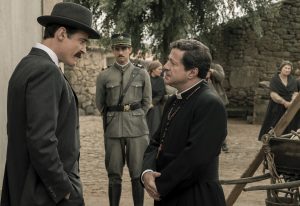 Mayor Arturo de Oliveira Santos (Goran Visnjic, left) and parish priest Fr. Ferreira (Joaquim de Almeida, right) debate opposing views about the legitimacy of the 1917 Marian apparitions of Fátima in director Marco Pontecarvo’s latest, “Fatima.” Photo by Claudio Iannone, © 2020, courtesy of Picturehouse.[/caption]
Mayor Arturo de Oliveira Santos (Goran Visnjic, left) and parish priest Fr. Ferreira (Joaquim de Almeida, right) debate opposing views about the legitimacy of the 1917 Marian apparitions of Fátima in director Marco Pontecarvo’s latest, “Fatima.” Photo by Claudio Iannone, © 2020, courtesy of Picturehouse.[/caption]
Given the backgrounds of the Fátima witnesses, it’s highly unlikely that they ever heard of conscious creation, especially since they didn’t know how to read or write before their apparition experiences. Nevertheless, they did understand the concept of faith, the principle that essentially infuses one’s thoughts, beliefs and intents with the energy that brings them into activation, be it in a traditional religious or conscious creation context. They drew upon this notion to spread the word of God as they understood it to help bring humanity back into alignment with its spiritual essence, a means to promote a greater degree of peace and understanding in a world desperately in need of it. Even if one doesn’t necessarily agree with the religious underpinnings of their message, who can realistically argue with the merits of the wider goal their work was meant to achieve?
It’s ironic that their story of the visions was so vehemently doubted. Considering that Lucia, Francisco and Jacinta were raised to be devoted followers of the Church and the teachings of Jesus, it’s more than a little incongruous that those who shepherded them into these beliefs had such doubt of their own. Indeed, where was the faith of those who supposedly so strongly championed it in the first place? How could they profess to believe these notions when they refused to accept evidence allegedly confirming them? Was this hypocrisy? Or did they not possess the faith that they said they had in the first place?
In situations like this, sometimes it takes incredible circumstances to reaffirm one’s conviction in something as fundamentally incredible as faith itself. That may take the recounting of a fantastic tale from a seemingly unlikely source for the point to be made and for the connection to be re-established. But, then, faith is often seen as something inherently fantastic, so what more fitting way would there be to convince someone of its existence than a fantastic tale imbued with its essence?
[caption id="attachment_11735" align="aligncenter" width="350"]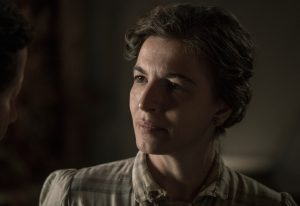 Maria Rosa Santos (Lúcia Moniz) seriously questions the claim of her young daughter that she witnessed an apparition of the Virgin Mary, contending that she’s made up attention-getting blasphemous stories, in the new faith-based drama, “Fatima.” Photo by Claudio Iannone, © 2020, courtesy of Picturehouse.[/caption]
Maria Rosa Santos (Lúcia Moniz) seriously questions the claim of her young daughter that she witnessed an apparition of the Virgin Mary, contending that she’s made up attention-getting blasphemous stories, in the new faith-based drama, “Fatima.” Photo by Claudio Iannone, © 2020, courtesy of Picturehouse.[/caption]
I should add once more that, even if one doesn’t agree with the specific religious notions expressed here, that does not invalidate the existence and power of faith. To do otherwise, clichéd though it may be, is tantamount to tossing out the baby with the bath water. Do we really want to do that when it comes to something that can help to work miracles? We should be sure to think twice before acting too rashly.
While it’s better than most faith-based offerings, unfortunately, “Fatima” doesn’t always hit its marks as effectively as it could have. Its spiritual teachings and messages are often shrouded in vague statements, unanswered questions and unexplained imagery, and its central faith-oriented focus is relentlessly overshadowed by repetitive interrogations of the young witnesses to the Marian visitations, overemphasizing the skepticism of doubters and giving the film more of a secular tone than a spiritual one. The picture makes up for this somewhat with generally fine performances and surprisingly good production values, but, at its core, the film leaves often viewers more muddled than enlightened when it comes to what it’s attempting to say. With better handling, director Marco Pontecarvo’s latest really could have been a breakthrough offering for this genre, but, as it stands, it’s merely a modest improvement over previously released films of this type, a missed opportunity for a class of pictures seeking greater respectability, credibility and acceptance. The film is playing in limited theatrical release and is available for first-run online streaming.
When we lose our faith (or think that we have), sometimes we need reminders to help get us back on track. But we must be careful not to overlook or ignore those synchronistic prompts when they appear, for doing so may delay the fulfillment of their purpose or, even worse, push us into a deeper state of disbelief. That could be a tragedy, keeping us from seeing the miracles around us – not to mention the happiness and satisfaction that faith can bring.
Copyright © 2020, by Brent Marchant. All rights reserved.
Monday, September 7, 2020
Check Out The Cinema Scribe on Its New Day


Saturday, September 5, 2020
‘The Last Full Measure’ seeks to rectify justice denied
“The Last Full Measure” (2020). Cast: Sebastian Stan, William Hurt, Ed Harris, Samuel L. Jackson, Christopher Plummer, Peter Fonda, Diane Ladd, Bradley Whitford, Amy Madigan, John Savage, Jeremy Irvine, Alison Sudol, Linus Roache, Dale Dye, Ser’Darius Blain, James Jagger, Zach Roerig, Ethan Russell, Cody Walker, Richard Seymour Cawthorne, LisaGay Hamilton, Asher Miles Fallica, Rachel Harker, Hannah Black. Director: Todd Robinson. Screenplay: Todd Robinson. Web site. Trailer.
An old adage maintains “Better late than never.” But is “late” truly acceptable? In many cases, it’s used as an all-too-convenient excuse for careless oversights, intentional snubs or even willful, agenda-driven and often-indefensible denunciations. It’s at that point when efforts to make up for those shortcomings often emerge, some of which slowly fall by the wayside but others of which succeed to rectify instances of “justice delayed is justice denied.” So it was for a band of zealous advocates who fought for the recognition deserved by a deceased war hero in the moving, fact-based drama, “The Last Full Measure.”
On April 11, 1966, troops from the U.S. Army’s 1st Infantry Division were ambushed while carrying out Operation Abilene, a mission that proved to be one of the deadliest campaigns of the Vietnam War. During the course of the fighting, the soldiers were surrounded and the division’s medic was injured, leaving the troops without anyone to attend to the wounded. The Air Force was called in to assist, with Pararescueman William H. “Pits” Pitsenbarger (Jeremy Irvine) volunteering to replace his Army counterpart. He was lowered from a helicopter into the middle of a firefight, where he heroically proceeded to care for 60 injured soldiers – even giving up an opportunity for his own evacuation – before being killed in action himself.
[caption id="attachment_11720" align="aligncenter" width="350"] Air Force Pararescueman William H. “Pits” Pitsenbarger (Jeremy Irvine) comes to the rescue of Army troops caught in a deadly ambush in Vietnam in 1966 when their medic is injured and unable to tend to the wounded in the engaging, heartfelt drama, “The Last Full Measure,” now available for home viewing. Photo courtesy of Lionsgate.[/caption]
Air Force Pararescueman William H. “Pits” Pitsenbarger (Jeremy Irvine) comes to the rescue of Army troops caught in a deadly ambush in Vietnam in 1966 when their medic is injured and unable to tend to the wounded in the engaging, heartfelt drama, “The Last Full Measure,” now available for home viewing. Photo courtesy of Lionsgate.[/caption]
In the wake of Pitsenbarger’s valiant efforts, he was posthumously awarded the Air Force Cross. However, his veteran colleagues and family members believed he deserved more, namely, the Medal of Honor, the military’s highest distinction. But, as the process to secure this honor played out, the request was inexplicably turned down. His supporters were mystified and launched a campaign to appeal the decision. They desperately wanted to see Pits receive his due, but, for 32 years, their efforts went for naught. Defense Department staff were repeatedly assigned to the case but with no success (most likely due to a lack of vigilant effort to see it through).
That all changed in 1998. Scott Huffman (Sebastian Stan), a young rising star in the Defense Department, was assigned to look into the request for a medal upgrade, a task he was reluctant to take on. As a Pentagon fast tracker, he was more concerned with his own career development than he was with taking on what was essentially seen as a thankless, dead end assignment (and one in which he had no prior experience at that). But, with the gentle but persistent prodding of his boss (Bradley Whitford) to at least make the semblance of an effort, he half-heartedly began an investigation into Pitsenbarger’s case.
Huffman initially met with Pitsenbarger’s staunchest advocate and fellow soldier, Tom Tulley (William Hurt). Huffman explained that medal upgrades were rare and that the likelihood of it happening in this case was slim, especially after 32 years. However, Tulley saw through Huffman’s attempts to shirk his responsibilities and guilted him into investigating further. Tulley related Pitsenbarger’s story in detail, making an impassioned plea to look into the matter for his colleague’s aging and ailing parents, Frank (Christopher Plummer) and Alice (Diane Ladd), both of whom wanted to live to see their son properly honored.
Reluctantly, Huffman traveled to Ohio to meet with Tulley and Pitsenbarger’s parents. They encouraged him to speak with several of Pits’s surviving colleagues to obtain new testimony to strengthen the case in favor of the upgrade. And so, before long, Huffman paid visits to a trio of veterans who witnessed Pitsenbarger’s heroism firsthand, Billy Takoda (Samuel L. Jackson), Jimmy Burr (Peter Fonda) and Ray Mott (Ed Harris). During these visits, Huffman learned more about Pitsenbarger’s courage under fire. He also heard their own stories, particularly with regard to the horrors they experienced and the ghosts that still haunted them.
[caption id="attachment_11721" align="aligncenter" width="350"] Pentagon staffer Scott Huffman (Sebastian Stan, left) and Army veteran Tom Tulley (William Hurt, right) seek to secure a posthumous Medal of Honor award for a fallen hero killed during a deadly ambush in Vietnam in 1966 in director Todd Robinson’s latest, “The Last Full Measure,” now available for home viewing. Photo courtesy of Lionsgate.[/caption]
Pentagon staffer Scott Huffman (Sebastian Stan, left) and Army veteran Tom Tulley (William Hurt, right) seek to secure a posthumous Medal of Honor award for a fallen hero killed during a deadly ambush in Vietnam in 1966 in director Todd Robinson’s latest, “The Last Full Measure,” now available for home viewing. Photo courtesy of Lionsgate.[/caption]
Through this experience, Huffman’s attitude slowly changed. He began to see the merits in upgrading the honor. He developed an uncharacteristic compassion for his subject. And he forged a bond with Frank and Alice, including a desire to see their wish realized. These attributes were further bolstered by a trip to Vietnam to meet with another of Pitsenbarger’s colleagues, Chauncey Kepper (John Savage), who took up residence in the embattled nation after the end of the war. Kepper, who penned a glowing recommendation for Pitsenbarger, explained that his testimony must have been lost during the 1975 Fall of Saigon, when many U.S. military records on file in Vietnam were destroyed or abandoned. Huffman learned that Kepper’s account, along with additional new revelations, could significantly help to pave the way for the fallen soldier. This heartfelt encounter also galvanized Huffman’s resolve to see things through, a radical shift in his outlook and personal character.
But, even with this new evidence, Huffman still faced huge hurdles to overcome. In the course of his investigation, he discovered that the denial of Pitsenbarger’s medal was tied to a cover-up of dirty little military secrets. And, on top of that, he also had to make an appeal to a Congressional sponsor for the request – in this case, a Senator (Dale Dye) who was involved in Operation Abilene and may have had an unwitting connection to the cover-up that prevented the awarding of Pitsenbarger’s honor, a longstanding conspiracy that Huffman later learned had been shamefully sustained by someone he had considered an ally.
Would justice be served in this case? And what would the outcome of this effort mean to Huffman and to Pitsenbarger’s family and friends? Clearly there was a lot at stake – and a lot to be gained – including for those who the hero touched but never met on the battlefield.
The inexcusable delay in recognizing the valiant behavior of William Pitsenbarger is indeed mind-boggling. The bureaucratic incompetence was bad enough, but the fact that this honor was denied for dishonorable reasons is infuriating. Thankfully, the efforts of his advocates to see this miscarriage of justice rectified is genuinely inspiring. Their belief in his selfless gallantry and their commitment to see his heroics properly recognized reflect a fervent conviction to realize this aspiration. It’s indeed one of the most commendable examples of the conscious creation process at work, the philosophy that maintains we employ the power of our thoughts, beliefs and intents in manifesting the reality we seek.
While the efforts of Pitsenbarger’s advocates may have taken some time to produce results, their ongoing commitment to the materialization of their goal is undeniable. Their faith in their beliefs to see the initiative realized demonstrates just how powerful these notions can be, even over an extended period of time and in the face of seemingly insurmountable obstacles. Such conditions can be frustrating, to be sure, but arduous circumstances need not doom our efforts. As long as we don’t lose sight of that, the possibility of success is always attainable.
[caption id="attachment_11722" align="aligncenter" width="350"]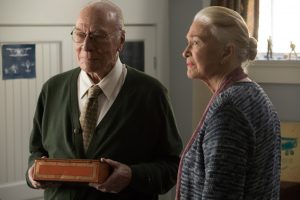 Frank Pitsenbarger (Christopher Plummer, left) and his wife, Alice (Diane Ladd, right), the ailing and aging parents of a Vietnam War hero, seek the fulfillment of a dream to see their late son posthumously granted the Medal of Honor, the military’s highest distinction, in the fact-based drama, “The Last Full Measure.” Photo courtesy of Lionsgate.[/caption]
Frank Pitsenbarger (Christopher Plummer, left) and his wife, Alice (Diane Ladd, right), the ailing and aging parents of a Vietnam War hero, seek the fulfillment of a dream to see their late son posthumously granted the Medal of Honor, the military’s highest distinction, in the fact-based drama, “The Last Full Measure.” Photo courtesy of Lionsgate.[/caption]
To fulfill an objective like this, we must be prepared to overcome our fears and live heroically. That could understandably be viewed as a daunting prospect, but Pitsenbarger’s backers had an inspiring example to draw from in overcoming this hurdle – his own battlefield behavior. When others may have turned tails and run, the intrepid airman stayed the course, remaining committed to his mission and even passing up an opportunity to evacuate for his own safety, despite the pervasive dangers. That’s significant, for, if such actions don’t inspire us to our own heroism, what will?
The fulfillment of a goal like this also calls for a willingness to surmount limitations, and, for those who fought for Pitsenbarger’s recognition, there were many to overcome. The bureaucratic maze, the lost records of his heroics, the intentional efforts to squelch the truth and the frustration of attrition alone may have been enough to discourage even those with the best of intentions. It can be exceedingly difficult to remain committed, for example, when we’re directly told that our efforts are likely to be futile, as Huffman tells Tulley in their initial meeting. However, breakthroughs of almost any kind never come about without an attempt to penetrate barriers. That may require tremendous tenacity, but, when armed with this quality, it may be possible to knock down such walls, even changing the hearts and minds of those who erect such hindrances in the first place.
Developments like these can go a long way toward encouraging such situations to evolve – and favorably so at that. One need only look at the evolution Huffman undergoes as this story plays out. It’s heartening to see how someone who began this effort disinterestedly because it impinged upon his own self-serving ends can become transformed over time. It’s a process that makes him a better man, a better husband and father to his wife (Alison Sudol) and son (Asher Miles Fallica), and, above all, a better soul to those in need of the newfound wellspring of compassion that emerges from within him. The inspiration that prompts his own transformation, in turn, enables him to return the favor for others, paying it forward so that others may benefit.
And this, by extension, beautifully illustrates the innate connectedness that we all share. Through Huffman’s efforts, we get to see how his work touches so many others, including countless people he had never met before – and even after – this experience. Like strands stretching out in all directions, the inherent linkage that binds us all becomes obvious, showing just how profoundly and effectively we’re all able to touch one another. Of course, none of that ever would have happened were it not for the initial efforts put forth by Pits himself. He may have died 32 years before he received his recognition, but his impact carried on all through that time – and beyond – affecting individuals he never met but who were touched by his presence, a stirring observation offered by Air Force Secretary Whit Peters (Linus Roache) at Pitsenbarger’s award ceremony.
[caption id="attachment_11723" align="aligncenter" width="350"]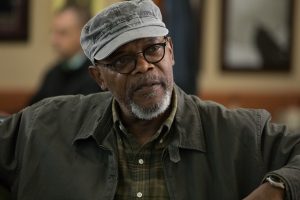 Army veteran Billy Takoda (Samuel L. Jackson) presents witness testimony to strengthen the case for a Medal of Honor award for a heroic fallen colleague in “The Last Full Measure.” Photo courtesy of Lionsgate.[/caption]
Army veteran Billy Takoda (Samuel L. Jackson) presents witness testimony to strengthen the case for a Medal of Honor award for a heroic fallen colleague in “The Last Full Measure.” Photo courtesy of Lionsgate.[/caption]
Imagine what kind of world we could have if we all held beliefs in line with such thinking. The horrors of conflicts like Vietnam could easily become a thing of the past. In fact, the effort behind such manifestations could be transmuted into something meaningful, such as the establishment of a butterfly sanctuary set up by Chauncey Kepper on the very site where Operation Abilene took place, a moving discovery Huffman makes while on his visit to Vietnam. That’s something to think about as we move forward and ask ourselves what kind of an existence we want to manifest for ourselves. Must we stay locked into outmoded conventions that no longer serve us? Or can we do better? We need not remain stuck as long as we’re willing to change our beliefs about what we seek to create.
I should note that I am generally not a huge fan of war films, but “The Last Full Measure” is a definite exception. The picture doesn’t hesitate to depict the hell that is war. And it doesn’t spare viewers the emotional fallout that its participants underwent, including the younger selves of Pitsenbarger’s colleagues (Ser’Darius Blain, James Jagger, Zach Roerig, Ethan Russell, Cody Walker) and his survivors, such as his parents and his devastated girlfriend, Jenny, who mourned his loss both in her youth (Hannah Black) and on into middle age (Rachel Harker). Yet, despite these painful images, the film also honorably recognizes the valor and generosity of those who were willing to make the ultimate sacrifice for the well-being of our fellow man. What’s more, it makes an eloquent case for considering the possibility of moving beyond conflict, to look at alternate ways for resolving our disputes. Should we succeed at that, we would be able to pay the ultimate tribute to soldiers like William Pitsenbarger for helping enlighten us to a path that need not include the barbarity they had to endure.
Sadly, “The Last Full Measure” is a movie that really got the shaft: Between being released in theaters in the cinematic wasteland that is typical of January (instead of the genuinely more fitting year-end awards season window) and a barrage of smarmy negative reviews by ever-so-cynical critics who are probably too young to remember the horrors of Vietnam (if they were even born during that time), this moving, heartfelt, fact-based story earns every bit of respect and emotion that it brings out of its viewers. With an excellent ensemble cast featuring superb performances by William Hurt, Samuel L. Jackson, Ed Harris, Christopher Plummer and Peter Fonda (in his final performance), this stirring tale tells a compelling, no-nonsense story about heroism, valor, sacrifice, compassion and inspiration and the quest to see those qualities properly lauded. Be forewarned that the film contains graphic images that may not be suitable for more sensitive viewers, but, to be fair, the picture never becomes gratuitous in its depictions of wartime events. To be sure, this offering, now available for home viewing, certainly deserved better than it got, both in terms of its distribution schedule and its critical reception. And that’s ironic, for this release ultimately suffered from the same unfortunate treatment as its principal subject, a wrong that truly should be made right. One can only hope that it finds a devoted audience in its secondary distribution venues – and brings honor to those who genuinely deserve the recognition.
In Abraham Lincoln’s Gettysburg Address, the President paid tribute to fallen Civil War soldiers by noting that they “gave the last full measure of devotion” to their nation. His statement has echoed through the ages, eloquently summing up what the brave did for their country. And, in circumstances such as these, it’s only fitting that they be honored for their efforts and commitment. To do less is indeed an injustice. That’s when the rest of us need to step in and take up the cause to see that their heroism is sufficiently praised, recognizing that their sacrifices were not unduly ignored.
Copyright © 2020, by Brent Marchant. All rights reserved.
